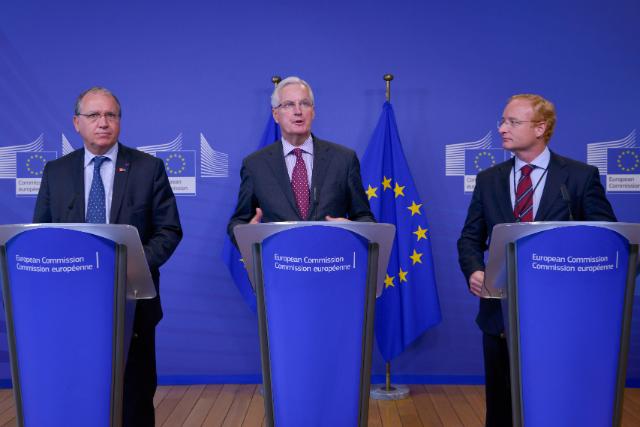

Michel Barnier and another couple of pro-UPC Frenchmen
YESTERDAY at Kluwer Patent Blog, a longtime booster of the UPC (because of this site's ownership), John Collins and Sumer Dayal published this long post that said "[t]he “plausibility” requirement reflects UK case law’s harmonisation with the practice and decisions of European Patent Office (EPO). On the other hand, the Full Court clarified that “classical insufficiency” is the relevant test in Australia."
The “plausibility” requirement reflects UK case law’s harmonisation with the practice and decisions of European Patent Office (EPO). On the other hand, the Full Court clarified that “classical insufficiency” is the relevant test in Australia.
[...]
The UK Supreme Court noted that the UK would be the only EPC jurisdiction (up to that time) to find the relevant claims to be insufficient. Lord Sumption considered that it would be “unfortunate” if courts in other EPC jurisdictions came to different conclusions, but noted that much depended on “how far the factual and technical evidence before the foreign court was the same“.
The harmonisation of sufficiency law would certainly be of assistance to the commercial interests lying behind second medical use patents. However, the approach of the UK Courts, as evidenced by the decision of the UK Supreme Court, continues to be skewed towards finding reasons to invalidate patents, rather than to uphold them.
"...these people will never rest until patent maximalism reigns supreme at all levels, including the Supreme Court."ResearchAndMarkets also promoted a lawyers' event "for the Pharmaceutical Industry" on Tuesday, with the UPC mentioned in it too [1, 2]. These are paid press releases. We saw similar press releases from ResearchAndMarkets in the recent past and these too mentioned the UPC.
"Corruption seems to be everywhere patent maximalism is to be found."Isobel Finnie (Haseltine Lake LLP) then used the buzzwords "Biotech Innovators" to promote an "UK IPO – EPO Operation" for patent maximalists when she wrote (trying to needlessly rush examination like the European Patent Office (EPO) does):
Unfortunately, due to backlogs at the UK IPO, applicants in the field of biotechnology have had to wait longer than 6 months to receive the UK IPO's search results. To tackle this backlog and to ensure that the UK IPO can continue to issue search reports quickly, the UK IPO announced on 1 February 2019 that they have signed a co operative searching agreement with the European Patent Office (EPO). Under this agreement, the EPO will perform 200-300 searches per year for UK applications relating to biotech inventions. The agreement will last for at least two years and is based on similar co-operation agreements which already exist between the EPO and other EPC contracting states including Cyprus, Greece, Italy, Latvia, Lithuania, Malta, Monaco and San Marino.
This is positive news for biotech innovators because all applicants using the UK IPO can expect to receive the valuable information they are seeking in a useful time frame.
Although UK applicants cannot chose whether their UK application is searched by the EPO, the search report will indicate which authority has performed the search and applicants whose searches are performed by the EPO may be entitled to the following additional benefits.
Firstly, where the EPO has completed the search for a UK application, a later filed European application claiming priority from the UK application could be eligible for a refund of up to 100% of the European search fee. Similarly, a later filed PCT application claiming priority from the UK application could be eligible for a refund of up to 84% of the international search fee where the EPO is the International Search Authoring (ISA). In view of the fact that the search fee for a UK application is currently only €£150 - compared to €1,300 for a European application and €1,775 for an international search by the EPO - this could result in significant cost savings for applicants.